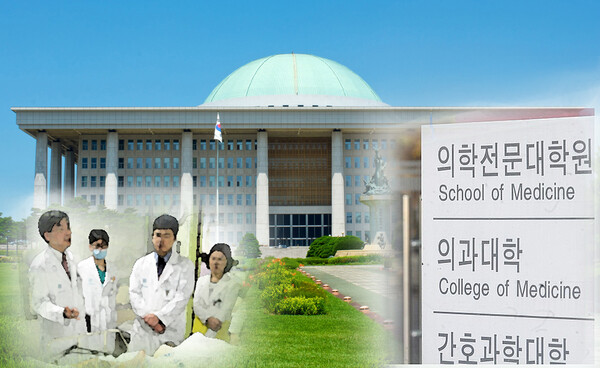As interns and residents are resigning en masse in protest to the government’s increase of medical school enrollment quota, the rivaling political parties have set about to persuade them, saying, “Let’s resolve it through dialogue.”
On Monday, the main opposition Democratic Party of Korea (DPK) announced its plan to establish an emergency task force for consulting with the medical community.

"The medical community is about to push ahead with a collective action in protest against the expansion of medical school students,” DPK leader Lee Jae-myung said on his Facebook account. "The medical community should immediately abandon the unreasonable and unjustifiable strike plan. The state grants doctors monopolized authority to practice medicine to protect people's lives. It is unacceptable to abuse it to endanger people's lives."
Noting that the issue has “turned into a power struggle between the government and doctors,” Rep. Lee emphasized that for the government’s policy to become effective in expanding public, essential, and regional healthcare, it should go in parallel with public and regional medical schools and introducing the regional doctor system.
"Increasing the number of medical students is not a simple arithmetic but a higher-degree equation that requires careful calculation, consultation, and coordination to clarify the purpose of the expansion and lead to results," Lee said. “Efforts for establishing public medical schools, setting up regional medical schools, and introducing regional physician system are prerequisite.”
Lee reiterated that the DPK would take the lead in passing public healthcare-related laws in the National Assembly and creating practical alternatives to guarantee the basic right to healthcare for the people.
"We will also form an emergency committee to consult with the Korean Medical Association (KMA) to ease conflicts and resolve social confusion," Lee said.
Ho Jun-seok, a spokesperson for the ruling People Power Party (PPP), also said, "The collective action of doctors against the expansion of medical school students is making medical turmoil a reality. Patients are left stamping their feet helplessly after some hospitals rescheduled surgeries and hospitalizations."
Ho stressed that doctors should be at the bedside of patients, not outside the hospitals and on the streets, adding that PPP hopes the medical community will realize the people will bear the brunt of the collective action and consider the difficulties of emergency patients and their families.
"The government is ready to listen to and communicate with the medical community to come up with systematic measures to improve people's lives and health," Ho said. "We ask the medical community to come forward for dialog and cooperate with us to develop realistic measures to protect people's lives and health and save essential, public and local medical care."
The ruling party also expressed the view that for the policy of increasing the number of medical schools to become effective, medical education must become far more substantive than now.
"An adequate increase in medical professionals is a necessary policy for Korea, which is heading toward a superaged society with regional healthcare disparities. However, the prerequisites for the success of the increase must be met," said Rep. Han Ji-ah, a former physician and a member of PPP’s emergency committee. “The essential healthcare package and the improvement of medical education are a must.”
Rep. Han pointed out that this cannot be done overnight. "We cannot expect medical schools to provide quality education when we increase enrollment by 65 percent," she said. "Healthcare policy cannot afford to under trials and errors. It needs additional government support.”
Han noted that doctors should also look at what they should demand from the government and what they should sacrifice for the future of healthcare rather than making emotional responses.
"The people suffer damages due to the confrontation between the government and doctors. PPP will work closely with the government and doctors for an early and reasonable resolution," she added.
Related articles
- Government pressures medical schools to disclose student information amid collective leave of absence protest
- Trainee doctors at ‘Big 5’ hospitals to resign en masse on Monday
- Why Korean doctors oppose increase in medical school admission quota
- Quota war between doctors, government intensifies, leaving patients helpless
- After exodus of trainee doctors, emergency care faces looming crisis
- Health ministry cites studies finding no basis for additional 2,000 medical students

